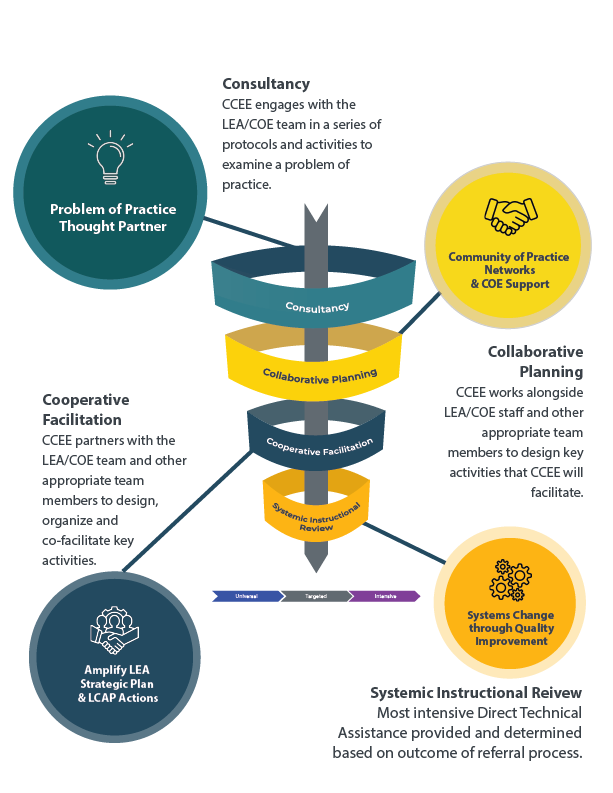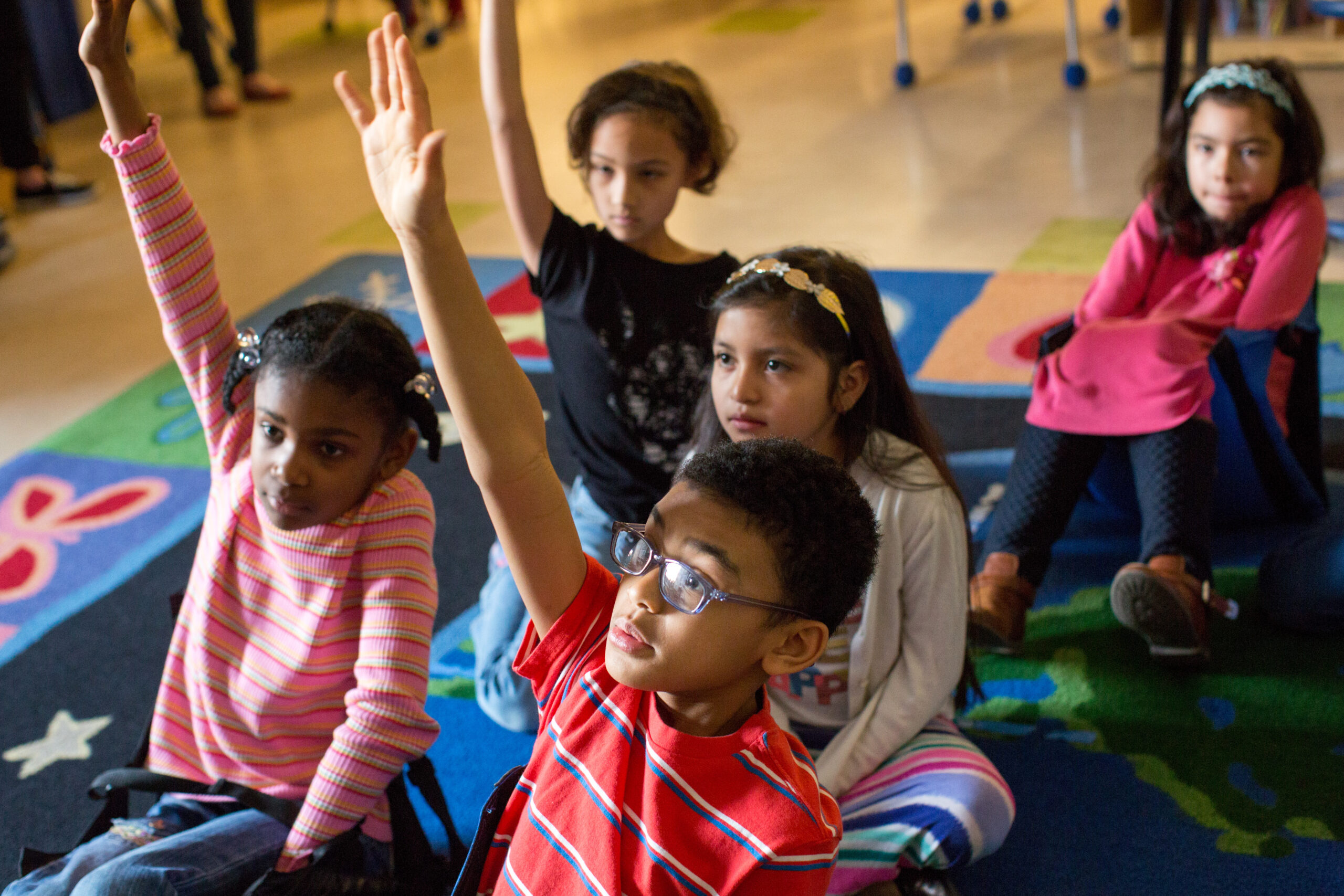News & Announcements
Project CLEAR (California Literacy Elevation by Accelerating Reading)
Project CLEAR builds capacity in implementing and accelerating literacy development in districts across the state. Educators can participate in one of two levels of professional learning offered through Project CLEAR – Teacher Leaders and Teachers. Participation is fully funded through Project CLEAR! For more information, see Project CLEAR’s webpage on our Learning Acceleration System Grant Website.
Project CLEAR’s Two-Unit Graduate Assessment Course
Project CLEAR now offers a two-unit graduate assessment course for interested teachers and administrators! The grant-funded coursework provides an overview of early literacy assessments in phonics, reading, and writing. The course is also designed to assist district and school leaders to develop, or redesign, a literacy acceleration plan to incorporate into their Local Control and Accountability Plan. For more information about this opportunity, please see Project CLEAR’s webpage.
Interested in Joining CEI?Applications to join the Cohort V of the Community Engagement Initiative opened in mid-January. This peer-led initiative brings together LEAs from every corner of the state to learn together about community engagement strategies and practices that strengthen relationships that affect student outcomes. Interested LEAs can find more information and apply at www.californiaengage.org/joining-cei
In Case You Missed It
Direct Technical Assistance Request for Proposal
CCEE is looking for respondents who can support partner LEAs in implementing State priorities. Further information is included in the Request for Proposal.
Looking AHEAD
California Collaborative for Learning Acceleration – 2024 Summit
Registration is open for the 2024 California Collaborative for Learning Acceleration (CCLA) Summit! The CCLA Summit is an inclusive hybrid space for educators to gain knowledge and deepen understanding of learning acceleration to reinvigorate classroom instruction to improve student outcomes. Both in-person and virtual participation options are offered.
Please join us on Saturday, March 16, 2024 from 8:30 am – 2:30 pm by registering here.
February Resources
- Direct Technical Assistance handout
- New CEI Learning Modules
- UDL for Educator Empowerment
- Microlearning Modules
- Statewide System of Support Resource Hub
About the Teaching, Learning, and Leading Center (TLLC)
Our team works in alliance with educators to improve teaching, learning, and leadership so every student is inspired and prepared to thrive as their best self.
About the CCEE
The California Collaborative for Educational Excellence is a statewide leader delivering on California’s promise of a quality, equitable education for every student.
Executive Director’s Corner
Inspiring Change through Direct Technical Assistance
By Matt J. Navo, Executive Director, CCEE

CCEE’s Just Cause to “inspire change” is central to our established purpose as an organization. Our collaborative approach emphasizes the power of partnerships and the collective strength that comes from working together. We leverage improvement science and equity-centered practices such as the Seven Circle Model to build initial and ongoing relationships that will sustain the work moving forward. Through our collaborative efforts in Direct Technical Assistance (DTA), the Teaching, Learning, and Leading Center (TLLC) leverages these practices to inspire change as they work alongside Local Educational Agencies (LEAs) in their collaborative improvement journeys. One of the objectives of DTA is to:
Advise and assist County Offices of Education (COEs) & Local Educational Agencies (LEAs) in need of targeted assistance in achieving their LCAP goals by effectively meeting the needs of students historically underserved.
TLLC, led by Dr. Stephanie Gregson, Deputy Executive Director, is dedicated to addressing the specific needs of LEAs under the umbrella of DTA. Below you will read more about DTA and the various levels of support TLLC provides in efforts to inspire change within the educational system.
What is Direct Technical Assistance?
By Stephanie Gregson, Ed.D., Deputy Executive Director, CCEE

Direct Technical Assistance sounds very formal and what you would expect from Education Code. Yet, Direct Technical Assistance, as our team at CCEE views it, is anything but technical – it is very much about learning and understanding together what type of support will lift the efforts in each district eligible for Direct Technical Assistance. The CCEE team approaches Direct Technical Assistance honoring the human work that is part of systems change. Our Direct Technical Assistance handout provides a brief overview of the different types of supports that can be accessed through Direct Technical Assistance but let me provide an example.
One of the districts we support asked us to review their strategic plan and collaborate on how we can amplify their actions within the strategic plan. One of the first steps after reviewing the district’s strategic plan was to conduct a crosswalk analysis with all the other plans the district was required to develop, including their LCAP. Our team worked with the County Office of Education team and district team to conduct this crosswalk analysis and help identify areas of alignment and detractors. The goal of this collaboration is to ensure focus and intentionality of all district and support actions align with the LCAP and Strategic Plan goals. Once this work is completed, all have a shared understanding of the goals, strengths, and areas of support. This approach provided the opportunity for all to learn and grow together and move forward with coherent intentions.
This is just one example of support provided through Direct Technical Assistance and there will be a few more examples throughout this newsletter. As our Executive Director mentioned, we are here to lift up and inspire change within our educational system. We are here for you.
Bolstering Supports in Partnership
By Rocio Gonzalez-Frausto, Assistant Director of the Teaching, Learning & Leading Center, CCEE
The CCEE DTA team may engage in a DTA partnership with districts, the County Office of Education, and GEO leads through various modes, as seen in Figure 1. As the modes progress, CCEE’s DTA support is intensified. Regardless of the mode, quality improvement practices are leveraged. In a Cooperative Facilitation partnership, the CCEE works with the district and COE leadership team from design to implementation of a targeted project or to serve as a launch to a District goal with the support of the COE as part of Differentiated Assistance (DA) it provides to the district.
For example, a district office could be working to implement its goals and initiatives with little consistent success. The CCEE, in this partnership, will leverage the COE Differentiated Assistance to identify the root cause. CCEE will co-facilitate Continuous improvement-driven sessions with the COE and District to support the district leadership in identifying the LCAP and instructional plan(s) alignment and immediate next steps. As part of the identified support, CCEE can provide leadership quality improvement coaching to targeted individuals on the team and serve as a connector to other supports found in the CA Statewide System of Support. The duration of the Cooperative Facilitation partnership will vary but will generally be a year at most. This example is one way a Cooperative Facilitation partnership may manifest between agencies.

Figure 1: DTA’s Spectrum of Support

Establishing Systemic Coherence through the SIR
By Erik Swanson, Senior Advisor of the Teaching, Learning & Leading Center, CCEE

The Systemic Instructional Review (SIR) is the most intensive level of support provided by CCEE’s Direct Technical Assistance (DTA) to local educational agencies. It involves an in-depth analysis of the district’s instructional systems, aiming to support district leadership in enhancing academic progress and social-emotional growth for every student.
Grounded in Fullan & Quinn’s Coherence Framework and quality improvement principles, the SIR process focuses on providing clear direction, fostering collaborative cultures, deepening learning, and securing accountability. During “Phase 1,” the CCEE collaborates with the LEA and COE teams to understand their specific needs and goals for achieving student success.
For “Phase 2,” various data gathering methods, such as school visits, focus groups, empathy interviews, and instructional crosswalks are employed during the process. This inclusive approach involves educational partners at multiple levels, including students, families, teachers, school site staff, administration, governance members, and district office leadership.
Following thorough data collection and analysis, in “Phase 3,” the CCEE continues to work closely with the LEA and COE to develop and support the implementation and sustainability of improvement strategies. The ultimate goal is to create a comprehensive Pre-K through 12 analysis of the LEA’s instructional systems, encompassing academic and social-emotional aspects, and ensuring the effective implementation of teaching, learning, and leading practices. This collaborative effort is designed to prepare every student to thrive as their best selves.
For more information on the SIR and the Coherence framework, visit the Teaching, Learning, and Leading Center’s SIR webpage.
Intensive Assistance Model
Rising from the Margins
Rising From The Margins is a compelling podcast series that explores the transformative journey of California’s economically challenged schools through the lens of the California Collaborative for Educational Excellence’s Intensive Assistance Model (IAM) pilot project. You can listen to the podcast now.
Reimagining Education: Insights from the Frontlines of School Transformation
CCEE, in collaboration with LEAs and partner organizations, will be hosting “open door” sessions to share best practices, tools/resources, and strategies to support student learning. These sessions will provide opportunities for county office and/or district staff to listen and learn from other LEAs across the state, and connect further, if interested. Those who express interest in connecting further will be invited to join a smaller, more intimate “Special Interest Group” session, in which the presenting LEA will be available to listen, share, and help participants with their questions or concerns related to the topic.
Join three exceptional school principals and teacher leaders for an inside look at how they are reimagining education at their schools. Through the IAM pilot, these educators have implemented powerful new strategies – centered on teacher collaboration and meeting individual student needs – that are delivering remarkable results.
Please join us on Tuesday, March 5, 2024 from 3-4 PM for an Open Door Session with Madera Unified School District.
Click here to register for this session.
